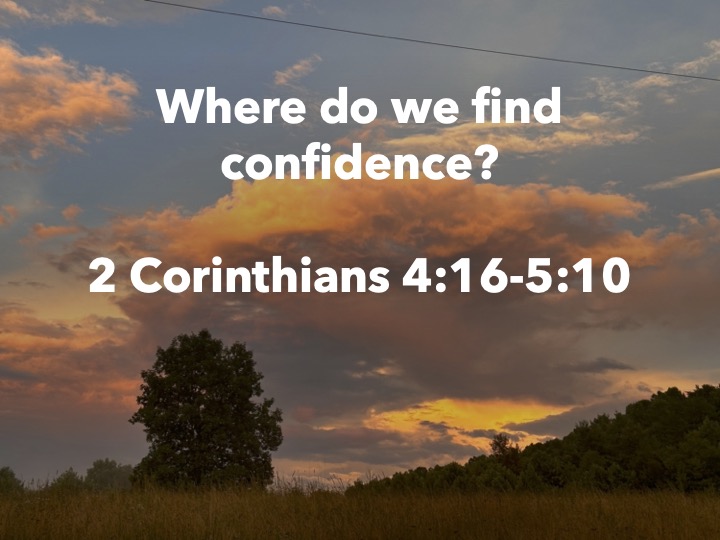Jeff Garrison
Mayberry and Bluemont Churches
2 Corinthians 4:16-5:10
August 13, 2023
At the beginning of worship
Where do we find confidence? Where do we get the strength to continue with life? Some may think they can dig deep inside themselves and find strength, but what happens when that fails? The confidence we need is best described in the opening of the Heidelberg Catechism. Our only comfort in life and death is that “I am not my own, but belong, body and soul, in life and in death, to my faithful Savior, Jesus Christ.”[1]
Jesus gives us confidence to live each day to the fulness of our abilities. As we’ll see today, Paul offers similar thoughts to the Corinthians. We do what we can in this life to bring God glory, knowing that in the life to come God will clothe us in eternity.
Before reading the Scriptures:
Last week in our scripture and sermon, we were reminded of the troubles Paul faced.[2] In 2 Corinthians 5:8-9, he recites a litany of troubles: afflicted, perplexed, persecuted, and struck down. Paul is counter cultural. These are not the kind of things one would generally advertise if you hoped to gain converts to the Christian faith. But through them all, Paul prevails. Paul’s hope, his confidence, is in God as revealed in Jesus Christ. Even when facing death, Paul doesn’t worry. He knows that in his Savior has something greater in store for him, which gives him the confidence he needs to continue in his ministry despite suffering for his beliefs.
Our passage today is one that is frequently read during funerals. I hear echoes within these verses of Paul’s words to the Romans: “If we live, we live to the Lord, and if we die, we die to the Lord; so then, whether we live or whether we die, we are the Lord’s.”[3]
Read 2 Corinthians 4:16-5:10
What is this passage about? Faith? Hope? Confidence? Judgment? Death? The life to come? Discipleship? The glory of God? You could make the case that each of these themes are present in these dozen verses of scripture, which is perhaps why one commentator refers to this passage as “notoriously difficulty.”[4] But let’s explore these verses and see what we might learn.
Paul begins this section with a refrain he used at the beginning of the fourth chapter, “We do not lose heart.”[5] When he first wrote this refrain, he discussed the trials he endured as a missionary. Now, he does what he often does in this epistle, he goes off on a tangent that touches on death and resurrection, hope, and judgment. Paul, in his previous epistle to the Corinthians, dedicated a long chapter to the resurrection, the most detailed account of this doctrine found in Scripture.[6] Now Paul gives another detailed account.
Of course, Paul doesn’t describe or anywhere, in detail the life to come. Instead, he speaks of the hope and the confidence we have in a future with God.
Inner and outer nature
Paul begins this section discussing our outer and inner nature. While our outer nature wastes away, our inner nature is being renewed. Here, Paul perhaps is trying to make his point understood by Greeks, especially non-Christians, who were more familiar with such philosophical concepts advanced by Plato and his disciples.[7]
While Paul isn’t saying the outer body is bad and we need to escape from it to some idealistic plane, he places our confidence in God working through our inner nature. While we live our lives in faith in this body, our ultimate hope is in the eternal future God has planned for us.
We will see clearly in the life to come
As he wrote in 1st Corinthians, where Paul spoke of us looking through a mirror dimly,[8] he now reminds his readers that we can’t see our hope. We live by faith in that which cannot be seen. This life, in which we live in faith, is temporary. The life to come, when we see God face to face, is permanent.
Three metaphors: Tent, House, Clothes
Paul then continues this thread as he uses three different metaphors: a tent, a house, and clothes. The tent would have reminded the Jewish readers of the tabernacle, that tent which reminded them of God’s presence during the Exodus, when their ancestors traveled through the wilderness.[9] But later, once settled in the promised land, they built a temple, a house for God, that was more permanent.[10]
Likewise, we are now on a journey, so we live in metaphorical tents. But in the life to come, God will provide us a permanent home. In the present, we groan, knowing there is something better. Here again, we hear echoes of Paul’s letter to the Romans, where he reminds us that all creation is groaning with us in labor pains as we await redemption.[11]
Next, Paul speaks of us being fully clothed. Again, the Jewish Christians who listened to Paul’s letter would have immediately realized he was speaking of a reversal of the fall and the curse. For when the man and woman in Eden broken God’s commandment, they realized they were naked. They tried to hide their nakedness, but God despite cursing them also took pity on them and provided clothes.[12]
Instead of envisioning going back to Eden, Paul looks forward to a future in which God clothes us in a manner that does more than hide our nakedness. Instead, we are totally remade with a new outfit. Furthermore, this life isn’t bad. After all, we’ve been given a “down payment” on the new life through God’s Spirit indwelling within us.
God’s Spirit provides confidence
God’s Spirit provides confidence even while we are still in these frail mortal bodies. Paul returns to the topic he began, where we must walk by faith and not sight. In this body in which God has given us in this life, we are to have confidence in God’s future, knowing God is with us now and will be with us in the future. Again, as Paul has reminded his readers in this letter, he repeats that our aim in this life is to please God. But this time he adds a twist. In the end, we will all appear before the judgment throne.
Judgment
We don’t like to think about judgment, do we? Some may think that because we are saved in Jesus Christ, we avoid judgment. But Paul contradicts such an idea here.[13] All of us, Paul says, will appear before the judgment throne and will be judged based on what we’ve done with our life in this body, whether good or evil. Paul includes himself in this universal judgment. Paul isn’t worried about his eternal state. He has confidence in his Savior. But Paul expresses concerned that there may be things he’s done on earth that wasn’t as pleasing to God as he’d like.[14] His concern and ours, as Christians, should be if we live up to our calling?
Summary
So, what is this passage about? Faith? Hope? Confidence? Judgment? Death? The life to come? Discipleship? The glory of God? It’s all here, and it’s all important. We must not lose hope. We must continue to be confident in our Lord Jesus Christ. Yes, Paul reminds us that we’ll stand before his throne of judgment. But don’t lose heart, for as he tells the Romans, not only does Jesus condemn us, but he also intercedes for us and that there is nothing that can separate us from his love.[15] Live in such grace. Amen.
[1] “The Heidelberg Catechism Question 1,” Presbyterian Church USA, Book of Confessions.
[2] https://fromarockyhillside.com/2023/08/06/our-value-is-from-god/
[3] Romans 14:8.
[4] C. K. Barrett, A Commentary on the Second Epistle to the Corinthians (1973, Peabody, MA: Hendrickson Publishers, 1987), 150.
[5] 2 Corinthians 4:1. See https://fromarockyhillside.com/2023/07/30/doing-what-is-right-because-it-is-right/
[6] 1 Corinthians 15. In 2019, I preached a series of sermons on this text. See https://fromarockyhillside.com/2019/06/02/the-resurrection-a-hymn-of-victory/ and go back from there to read these sermons.
[7] Barrett, 146.
[8] 1 Corinthians 13:12.
[9] See Exodus 25-27.
[10] For an understanding of the temple, see 2 Chronicles 2-7.
[11] Romans 8:18-25, especially verse 22.
[12] Genesis 3, especially verses 10, 21)
[13] See also 1 Corinthians 3:13-15, Romans 14:10-12.
[14] Ernest Best, Second Corinthians: Interpretation, a Bible Commentary for Teaching and Preaching (Louisville, KY: JKP, 1984), 48-49.
[15] Romans 8:34-35.



Well done, good sir, well done! You deal head-on and excellently with the promises and puzzlements of a text that I think many tiptoe around. Strong, encouraging preaching.
Thanks, Richard, for your comments. I am really enjoying spending a considerable amount of time in 2 Corinthians. It’s an important book.
Thanks for making these scriptures so understandable, Jeff. Hope, faith, and don’t lose heart. This life isn’t bad; there is a lot that is wonderful in it. Take care!
I sometimes have to really work hard to focus on living in this life (as God means for me to live). It’s too easy to look forward to the next life.
You take some beautiful photos!
Thanks. The life to come is something to look forward to, but not at the expense of missing out on this life which can also be good.